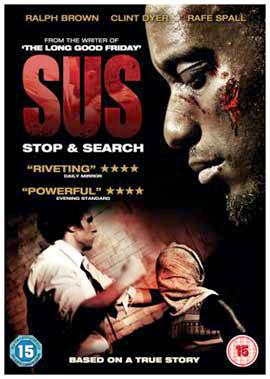 A review of SUS (2010) by Barrie Keefe, directed by Robert Heath, available on DVD
A review of SUS (2010) by Barrie Keefe, directed by Robert Heath, available on DVD
Director Robert Heath revives writer Barrie Keefe’s stage play in a new film depicting a harrowing case of police racism and brutality, set during the election night of 1979. Clint Dyer plays Delroy, a black man who is held in custody on suspicion of murdering his wife, during which time he is humiliated and beaten by police officers Karn and Wilby in order to extract a confession by any means.
The film itself is largely stripped back to a core of the three actors, played out in a single room with a few props, focusing all attention on the dialogue and a dark hopeless atmosphere. Although this sets the film off to a somewhat unclear start, it eventually develops and progresses until the atmosphere becomes gripping enough to draw the audience into a frightening and realistic depiction of the British justice system. Keefe’s script does not play down the importance of the political climate of the time and its influence on the police as a repressive organ of the state. It is clear that Keefe refutes the assertion that the police can or do play an ‘apolitical’ role in the system. The writer depicts this through the character of officer Karn, a macho and right-wing cop who basks in the prospect of ‘the new dawn’ under the upcoming Thatcher government. Karn buzzes and darts around the police station, keeping check on the election results throughout the night, ecstatic at the thought that the police will hold a new and more powerful control once the new Tory regime is in place. Whatever new highs of repression Karn longs for, the SUS law of the film’s title (an extension of the archaic Sections 4 and 6 of the Vagrancy Act 1824) had of course been extensively used under all the previous Labour governments and was only abolished following the widespread uprisings of 1980-81 in Leeds, Bristol, Liverpool, Birmingham and London.
The depths of depravity, racist slurs and violence depicted in the film are all too familiar when discussing the British police, who have proven through history their role in oppressing black people in Britain and using those incarcerated as a punch-bag for their own depraved and distorted justifications. The film provides a painful reminder of the many innocent black people who have been harassed, imprisoned, brutally beaten and murdered by the British police. However it also embodies the resistance of the black working class in Britain and is a call out to all anti-racists to continue to confront police and state racism. In a gripping scene towards the end of the film, the morning after Thatcher’s victory and Delroy’s night-long ordeal of being beaten by sadistic officer Wilby, officer Karn asks ‘You a political man Mr Delroy?’, to which Delroy replies ‘Yesterday I’d had said no, today I begin.’
Anthony Rupert




